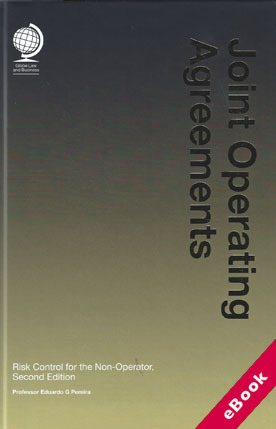
The device(s) you use to access the eBook content must be authorized with an Adobe ID before you download the product otherwise it will fail to register correctly.
For further information see https://www.wildy.com/ebook-formats
Once the order is confirmed an automated e-mail will be sent to you to allow you to download the eBook.
All eBooks are supplied firm sale and cannot be returned. If you believe there is a fault with your eBook then contact us on ebooks@wildy.com and we will help in resolving the issue. This does not affect your statutory rights.
Joint operating agreements (JOAs) are well-accepted standard agreements in the oil and gas industry which regulate the relationship between the parties to a joint venture: the operator and the non-operator.
Traditionally, the operator is responsible for performing operations on behalf of the consortium, while the non-operator is responsible for contributing to the financial commitments of the joint venture. However, due to the strong position typically maintained by the operator, this structure does not always accurately reflect the non-operator’s position.
Unbalanced agreements can create uncertainty, increase the risk of litigation and even jeopardise the very existence of the consortium. Therefore, it is essential to understand the position of both parties in order to ensure a fair and reasonable negotiation, and this fully updated second edition provides an in-depth analysis of the JOA from the perspective of the non-operator.
Coverage includes an examination of the relationship between operators and non-operators under general law, and an analysis of the critical issues facing non-operators in a JOA. In addition, this book reveals how a non-operator can seek to protect its interests – initially through tight control of operations and expenditures, and ultimately through adequate remedies to remove the operator and/or restrict its liability. Further, this edition provides recommendations to address these concerns and also includes the JOA model form from Mozambique as well as reviews of other JOA model forms explored in the first edition.
JOAs are relevant to law, finance, human resources and operations. This book provides invaluable practical guidance for in-house counsel, private practitioners, executives, academics, international oil companies, national oil companies, independents and anyone interested in investing in the upstream sector.